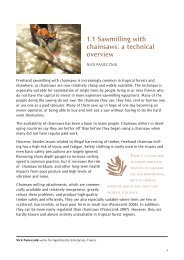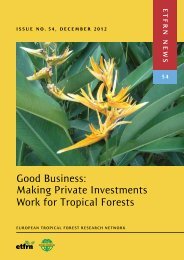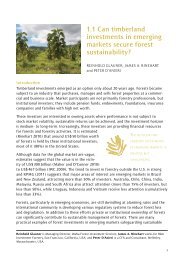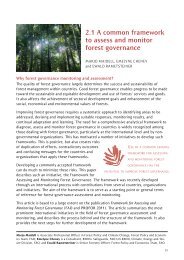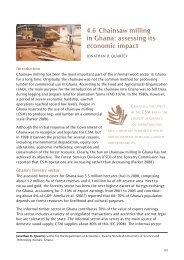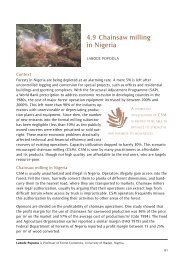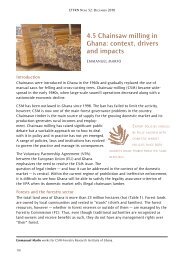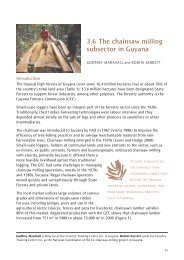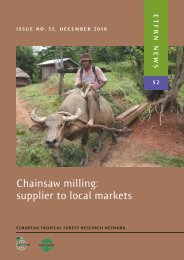Chainsaw milling: supplier to local markets - European Tropical ...
Chainsaw milling: supplier to local markets - European Tropical ...
Chainsaw milling: supplier to local markets - European Tropical ...
You also want an ePaper? Increase the reach of your titles
YUMPU automatically turns print PDFs into web optimized ePapers that Google loves.
3.3 susTaiNablE maNagEmENT oF guaDua bamboo FoREsT, colombia<br />
Contribution from legislation<br />
since 2001 the Cars from the coffee region states (Caldas, Quíndio, risaralda, Tolima and<br />
Valle del Cauca) initiated activities in the framework of the Manejo Sostenible de Bosques en<br />
Colombia project <strong>to</strong> improve the forest management of guadua stands. one of the outcomes<br />
was a Norma Unificada para el manejo de guaduales naturales (norm), which defined<br />
the guidelines for management within the framework of legislation. a terms of reference<br />
for the management and harvesting of guadua stands (TrmhGs) was also defined.<br />
no precise specifications are described in the norm or<br />
TrmhGs for each product obtained from guadua forest.<br />
The <strong>to</strong>tal volume authorized includes all products that can<br />
be harvested.<br />
norm and the TrmhGs aim <strong>to</strong> achieve the sustainable<br />
management of guadua stands. stands that fulfilll these<br />
requirements are registered as having sustainable management.<br />
in such cases, farmers receive incentives, reduction of<br />
taxes and technical assistance.<br />
Planning of guadua forest<br />
The Manejo Sostenible de Bosques en Colombia project carried<br />
on an assessment of land suitability and potential areas for<br />
establishing guadua plantations in the coffee region of Colombia. a <strong>to</strong>tal of 24 variables<br />
were used for analysis and <strong>to</strong> develop a model for land suitability. The variables were associated<br />
with five fac<strong>to</strong>rs representing site conditions: <strong>to</strong>pography, climate, soils, landscape<br />
ecology and socio-economics. by using a simple decision model based on the five fac<strong>to</strong>rs,<br />
four classes of land capability were defined: low, marginal, moderate and high.<br />
only 2% of the <strong>to</strong>tal area evaluated had high capability for guadua production. These<br />
areas were located close <strong>to</strong> urban centres. The main limitation for guadua production was<br />
the lack of roads (for access) and <strong>markets</strong>. areas over 2000 m in elevation were immediately<br />
excluded, because guadua does not grow well at that level.<br />
Forest governance<br />
The bosques FlEGT/Colombia project also aimed <strong>to</strong> improve legality and governance so as<br />
<strong>to</strong> contribute <strong>to</strong> sustainable management and the improved productivity and commercialization<br />
of forest resources from small farmers. The project had several achievements:<br />
• involvement of a range of stakeholders from the entire production chain in the<br />
development of forest management norms;<br />
• optimization of the approval process for guadua forest harvesting;<br />
• technical assistance <strong>to</strong> support legal forest management;<br />
• voluntary forest management certification (FsC) for small farmers and elaboration<br />
of specific standards for guadua stands;<br />
• articulation of the preventive, juridical, administrative and operational aspects of<br />
guadua forest management;<br />
• cross-sec<strong>to</strong>r agreement for legal timber in Colombia;<br />
75



